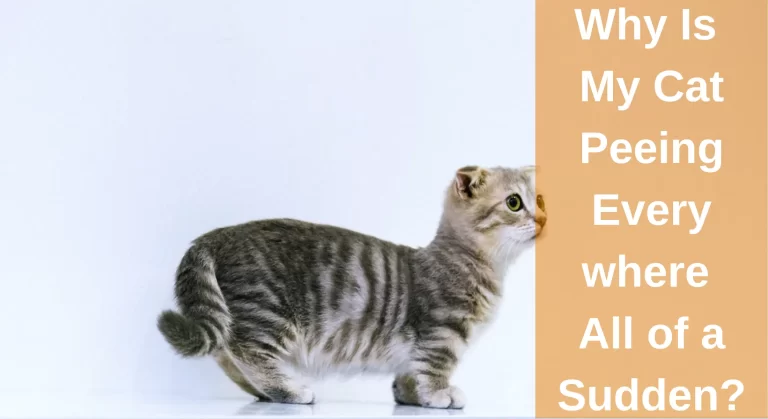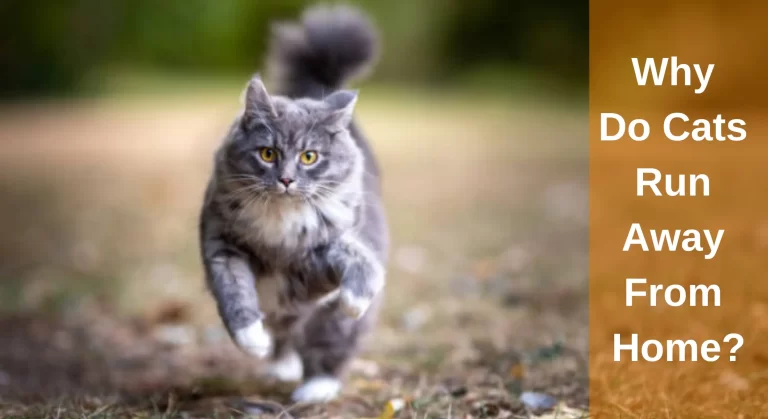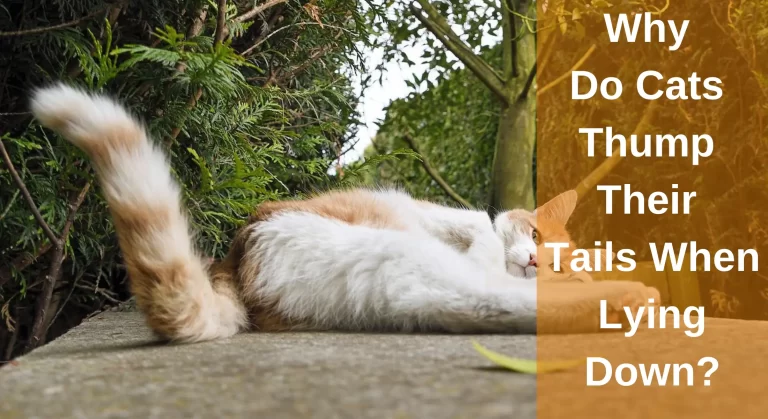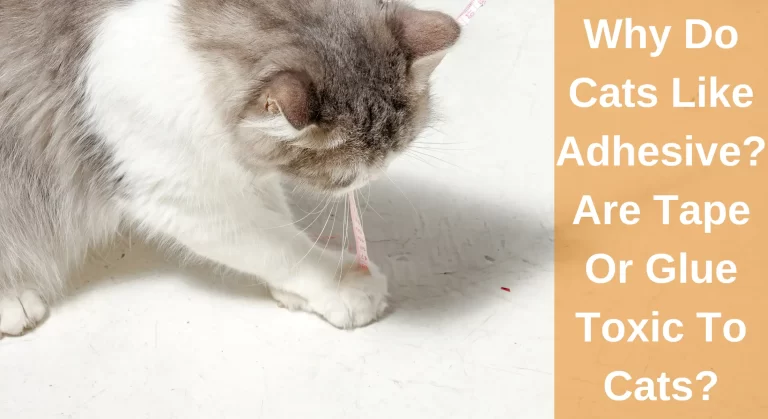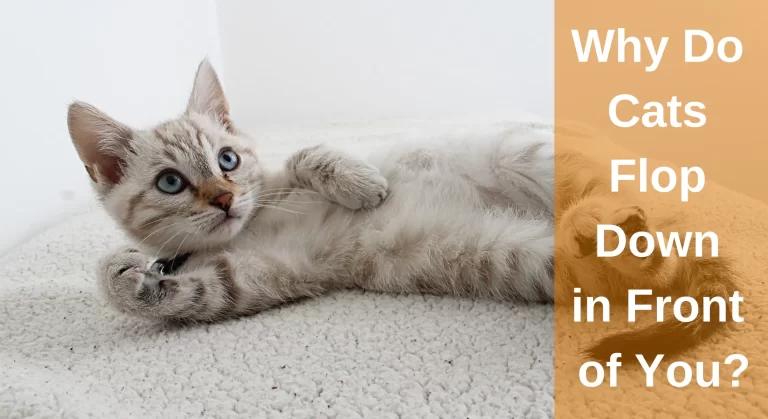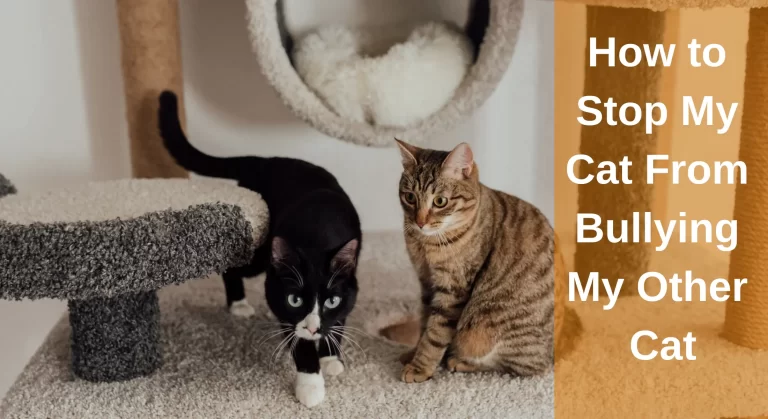Why Do Mother Cats Hate Their Kittens? [Answered]
A mama cat cuddling and nursing her kittens is among the most adorable sights. Even within kennels, motherless kitties may occasionally be placed with breastfeeding mothers who could love and care for them as their kittens. But sometimes you may have noticed that the mother cat rejects their kittens and most of you might get confused and ask why she does that. Why Do Mother Cats Hate Their Kittens?
Mother cats don’t hate their kittens. Sometimes they may appear to “hate” them, but it’s because they are teaching them to be independent or protecting them. If the mother cat seems upset, it could be due to stress, illness, or if the kittens are sick or hurt. But she doesn’t truly hate them; it’s just her natural instincts at play. The other factor that causes a mama cat to hate her kitties is her kittens become mature. After a kitten reaches a particular age, it may appear as though its mother dislikes them. Her emotions are informing her that kitties will start growing up and making independent decisions. If you’re worried about her behavior, it’s best to take her to the vet to check for any health issues.
So now you’re aware. But you might be worried and want to resolve this issue to keep your kittens safe. In this article, I’ve covered the answers to your every question. So, continue reading to learn more about these solutions and why she behaves like that.
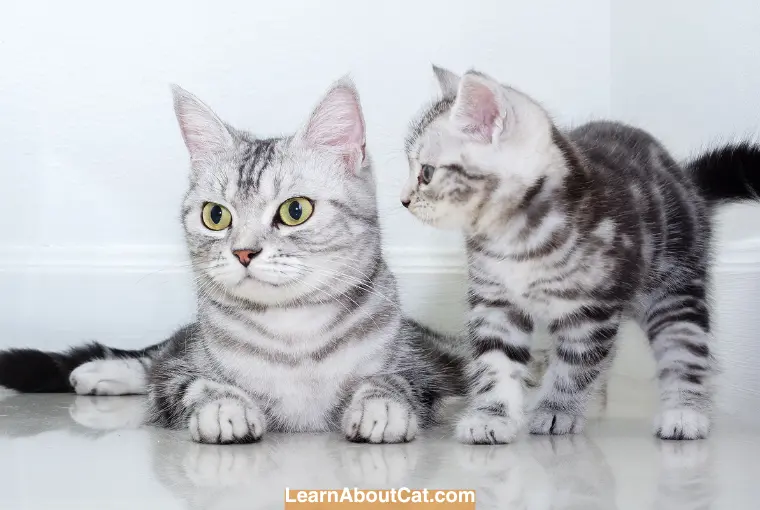
Do Mother Cats Lose Their Maternal Love Over Time?
Mother cats generally do not lose their maternal love over time. However, as the kittens grow, the way the mother cat shows her love changes. After the kittens stop nursing, she spends less time feeding them and more time teaching them hunting and survival skills. This might seem like a change in her love, but it’s just a natural part of their growth.
As the kitten grows into adulthood, mother cats may reduce their maternal affection. A mama cat might not feel the same urge to attend to all her kittens’ needs and may choose to spend more time alone, resting, or sleeping.
Over time, her anger is probably going to lessen. She won’t be as protective of them as she once was since she is aware that they no longer depend on her. This change in behavior is normal as the kittens become independent and can take care of themselves.
Find Out: Can A Cat Get Pregnant While Nursing?
Why Do Mother Cats Hate Their Kittens?
It’s uncommon for the mama cat to hate her kittens. The age factor determines how long a mama cat may become separated from her babies. Since the newborn kittens depend entirely on their mother. But as they grow up, mama cats started hating their kitties. Below are some of the causes for a mama cat that makes her hate her immature kittens.
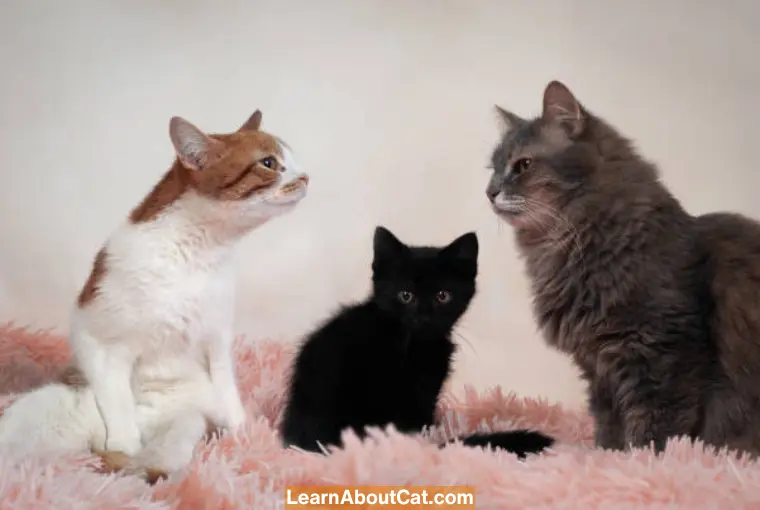
1. Mama Cat is Untrained
A feline can become sexually active as early as 4 months of age and deliver a baby as late as six to seven months. These felines aren’t old enough to give birth.
Any new mother can become agitated by giving birth or distracted by the meowing kittens and end up rejecting her children. After becoming moms for the very first time, even older felines might become terrified.
A feline may bring its kittens to you in an attempt to get assistance if it is unsure of how to handle them. Some may shriek at their young or leave the nest right after giving birth. Regrettably, it’s also feasible for mama cats to accidentally suffocate their kittens.
Check Out: How To Tell If A Cat Is Pregnant?
2. Mother is Suffering from Mastitis
If a mama cat gets mastitis, she may stop giving her kittens food. It is a chest inflammation that makes feeding difficult for the mama cat because it produces discomfort and edema.
Fever, a loss of hunger and sticky, yellow secretions are the typical symptoms of mastitis. The breast becomes warm and red as compared to the other nipples. Mastitis typically results from pathogenic bacteria.
When battling over the nipple, kitties may claw their mother, allowing bacteria to penetrate the body. If you discover that your kitties aren’t putting on weight as they used to, mastitis may also be the reason. Due to this disease, the mother cat becomes irritated and may hate their kittens for giving her pain.
3. Mama Cat Loses Maternal Affection
After Kitties are born and grow into adulthood, cats lose their maternal instinct. The hormones that are important in triggering this desire become abnormal, thus certain cats with hormonal disorders or imbalances are incapable of becoming good moms.
Such felines may hate their kittens, assault the young after delivery, or growl at the young as if they were strange cats.
4. Kitties are Sick
The mama cat may hate her kitties because they’re sick. Even if the infant appears to be in good health to you, the mom senses scent and detects illness. The kitten may be too frail to feed or have a birth problem. So, it will require a few months for your feline to heal because giving birth and feeding are very taxing on a cat’s body.
Your cat doesn’t see the value in trying to care for sick kitties. So, if the mom doesn’t believe the kitties will recover, she may quit taking care of the poor kittens or hate them.
Find Out More: Do Cats Inbreed? Things Cat Owners Should Know
5. Kittens are Mature
As time passes, elder kittens are hated by their mama cats because they become mature. So, it is typical for a cat to abandon her kittens once they are between 3 and 4 months old. Cats should stay with their moms till they reach 12 weeks old.
Some cats may by then begin hissing at their elder kittens or “hurt” them if they tried to feed them. There isn’t anything you could do to prevent it, which is sad. That is a necessary aspect of becoming mature.
6. The Mother Cat is Terribly Sick
Felines have trouble giving birth occasionally, but it does happen. Sometimes the mama cat can’t give birth to the entire litter, or a little portion of the placenta might be left inside the body. In such circumstances, the mother will eventually shrink and weaken. She will not be able to look after her infants and will hate them.
Moreover, due to milk fever mother cats also hate or avoid their kittens. It is because her calcium levels are incredibly low. It’s a potentially fatal illness that needs immediate medical attention. Big cats or first-time mothers giving birth to large litter are more likely to get milk fever because these are undernourished cats.
What Can You Do to Protect Your Kitten from its Mother?
Neutering or spaying the kitties is an approach that some owners used if they want to maintain a healthy relationship between kitties and their mothers. After neutering or spaying the kittens, the mama cat will likely accept them.
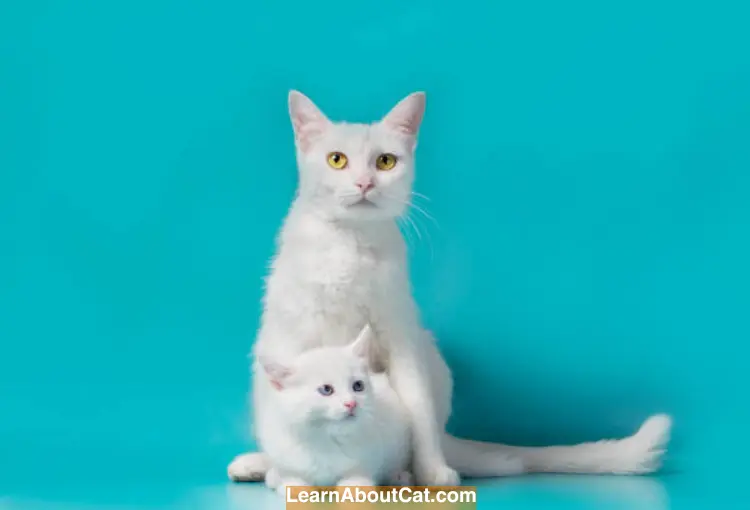
It’s a helpful technique for those owners having multiple cats in their homes. So, when they can’t check on their kitties and the mama cat together, it’s a great way to separate them if they aren’t mature to be spayed/neutered.
Also, Check Out: Why Does My Cat Keep Moving Her Kittens?
How Can You Train Your Mother Cat to Stop Being Aggressive?
Make sure that mama cat is provided with her own meal, water, and litter tray so you can teach her to become less hostile. She is much less likely to perceive the kitties as dangerous if she does this.
Try to organize your house so that they will be sheltered till she sees they aren’t a danger to her area. Baby doors and spare rooms are helpful for this purpose.
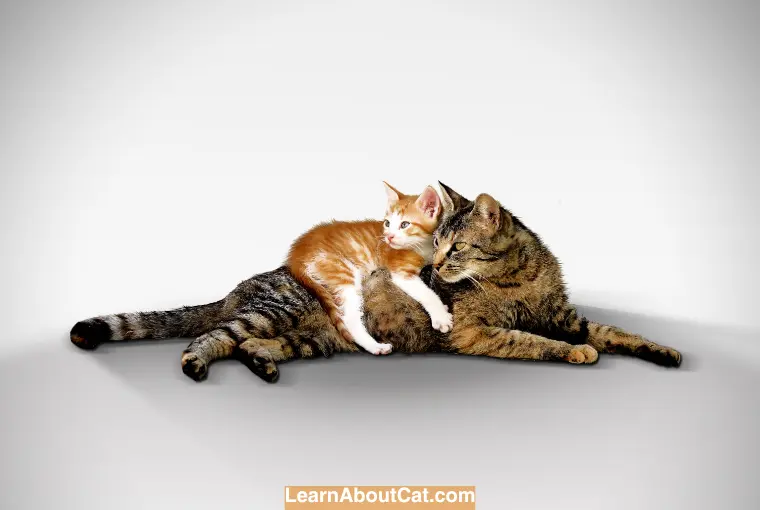
Although it’s normal for the mama cat to be hostile, you may assist make her relaxed by doing these easy things. First of all, you need to realize that this hormonal activity is a wholly natural tendency.
She’s only being aggressive, so try not to become mad at her; she doesn’t mean to be rude. If the mama cat uses her own resources, she will probably be less hostile. The mother will probably be more welcoming when the kittens are older.
Also Read: Can a Neutered Cat Live with an Unneutered Cat
Do Mother Cats Abandon Their Kittens?
After the kitties reach a particular age and are able to care independently, it is common for moms to leave them. A total of 4 kittens are born in each birth when a female feline becomes expected twice per year.
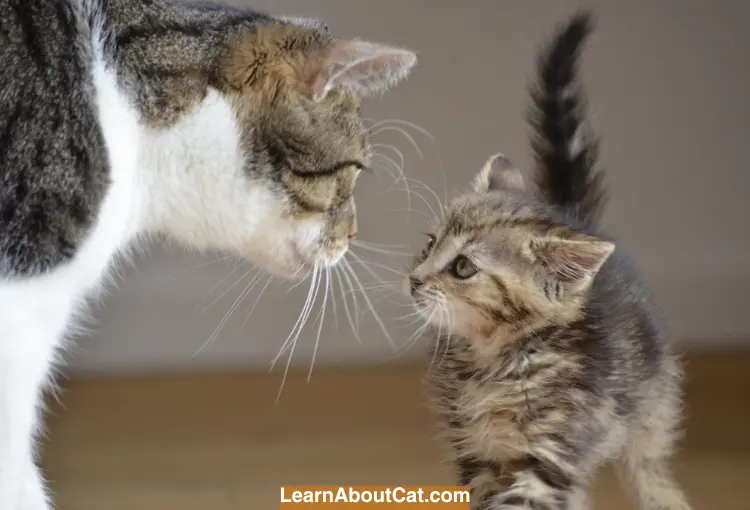
The mama cat will end with a plethora of kitties chasing her around if she wouldn’t leave her litter. They will consume all of the meals in addition to draining her energy.
When her kitties are mature enough, a feral mama cat will leave them in order to survive. Because of this, it may appear like your mama cat dislikes her young, but this is just a natural impulse.
Interesting Reading: Why Is My Nursing Cat Always Hungry? [Answered]
Frequently Asked Questions
How can the mother cat be recovered from maternal behavior issues?
During this time, it is essential to create a relaxed atmosphere, limit guests, refrain from touching or petting the mama cat, separate her kittens, and hand-feed them. All these tips will help you to lessen your mama cats’ maternal behavior problems.
Why do mother cats attack their kittens?
Mother cats attack their kittens for several reasons, including:
Kittens becoming mature and independent.
Lacking motherhood affection
Stressful environment
Kittens become sick and deformed.
Mama cat becomes afraid of other felines, visitors, or loud noises.
Mama cat may be a first-time mother
How to care for newborn kittens and a mother cat?
After bringing newborn kitties to your home, you should follow these guidelines:
Place them in a separate room
Keep them warm
Provide them with a perfect nursing space
Give them a separate meal and water bowls
Provide them with clean litter boxes
Check their weight and health regularly
Prevent them from any diseases
Engage with your kittens so they become aware of human love
Do stray mother cats hate their kittens after they grow up?
In most cases, stray mother cats do not hate their kittens after they grow up. As the kittens mature, the mother cat naturally allows them to become independent and explore the world on their own. However, some stray mother cats may show aggression towards adult offspring, which is a way of protecting their territory and ensuring resources for their younger offspring. This behavior may make it appear as if the mother cat dislikes her grown-up kittens. Stray Cats’ behaviors are driven by instinct and survival, not complex emotions like hate. Gradually allowing the kittens to be independent is essential for their well-being and natural development.
Can kittens stay with their mother forever?
Kittens can grow up and stays with their mum. But don’t expect the mother cat to always act like their mom. The mother will slowly stop providing care once the kittens are fully nursed, at which point they will be able to survive on their own.
Do mother cats get tired of their kittens?
When the kitties are nursed, it’s common for the mama cat to feel uneasy in their company and she may hiss at them if they stick with her for so long. Being a mother is a tiring job, it’s quite normal for a mama cat to become aggressive over her kittens because she may get tired of doing that. However, if this behavior continues, you must check the mother cat as she might be suffering from some disease.
Do mother cats have favorite kittens?
All kittens are the same for the mama cat, they love and show equal care to each kitty.
Will my cat hurt a new kitten?
Cats are incredibly territorial. Most probably, your domestic cat thinks they own your house, so he may attack the new kitten. Making interactions slowly is crucial since a new kitten may appear like a challenge to his territory.
How long does maternal aggression last?
The duration of maternal aggression can vary from a few weeks to a few months, depending on the individual cat and her kittens’ development.
Conclusion
For any animal, parenting can be difficult. The seemingly hostile behavior of mother cats towards their kittens is a complex interplay of hormonal changes, illness, kitten maturity, instinctive protective behaviors, and social dynamics
Hormonal fluctuations during and after childbirth can influence a mother cat’s emotions and actions. If the expectant mother wasn’t in a safe environment or experienced physical pain during labor, for instance, she might have been traumatized while giving birth. It could be tough for her to unwind and lay on the floor so the kitties can nurse due to her anxiety.
Train your mama cat and make her relax. If she feels irritated leave her for some time, she’ll be fine. Don’t force mama cat to feed her young ones, she may get irritated and hurt her own kitties.
Who is Isabella?
My name is Isabella, and I am a dedicated and knowledgeable cat enthusiast. With years of experience caring for cats and a deep love for felines, I made a mission to help other cat lovers navigate the challenges of cat ownership.

